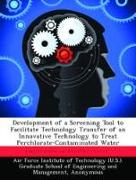Development of a Screening Tool to Facilitate Technology Transfer of an Innovative Technology to Treat Perchlorate-Contaminated Water
BücherAngebote / Angebote:
Perchlorate contamination of drinking water is a significant problem nationwide. The purpose of this study was to develop a tool to predict the cost and performance of tailored granular activated carbon (T-GAC), an innovative technology that is being evaluated as a cost-effective treatment for perchlorate-contaminated water. The ability to accurately predict performance and cost can facilitate the transfer and commercialization of innovative technologies. In the study, a model was developed to predict T-GAC performance and life-cycle costs for removing perchlorate under varying influent water quality and technology operating conditions. The model's design parameters were obtained from laboratory rapid small-scale column tests (RSSCTs) using inverse modeling. Cost data used in the model were based on conventional GAC installations, modified to account for tailoring. The parameterized model was used to predict the observed performance from a pilot-scale field demonstration at a water treatment plant in Southern California. The model over-predicted field performance, however, it predicted reasonably well the results of laboratory RSSCTs for two waters that were not used to calibrate the model. Using the screening model, it was found that annual operation and maintenance (O and M) costs are more significant than capital costs, and that costs associated with media regeneration or replacement dominate the O and M costs.
Folgt in ca. 15 Arbeitstagen





